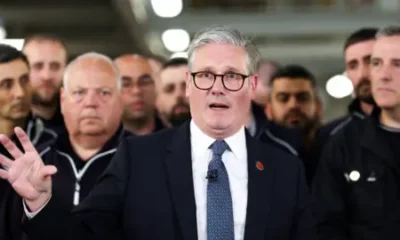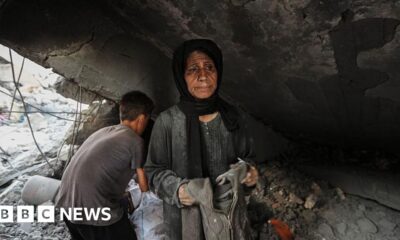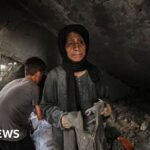Business
Rodgers’ ‘realism’ hints at Celtic’s new normal in Europa League

Read full article on post.
-
58 minutes ago
“We are where we are. This is a good point for this group of players.”
Brendan Rodgers’ immediate post-match reaction to Celtic’s Europa League opening draw away to Red Star Belgrade is arguably a sign of their new norm.
Twelve months ago, on the eve of their Champions League curtain raiser against Slovan Bratislava, the manager said he was “in the best place I’ve been” at the club.
After a painful play-off defeat to Kairat Almaty ended hopes of participating in the elite competition again this season, the Scottish champions – after much criticism – were consigned to the Europa League.
Their return to the second-tier competition was initially an impotent one, but the introduction of goalscorer Kelechi Iheanacho ignited their play and provided what Rodgers called “a great platform” of a first point.
From feeling “the most ready” for a crack at the Champions League one year ago to requesting “realism” in the Europa League, what is Celtic’s European landscape looking like now?
Had this draw in the raucous Marakana been in the Champions League, the praise may have been piling in.
But while Celtic were enduring their calamity in Almaty, Red Star were left red-faced by Cypriot champions Pafos in the play-off.
Both sets of supporters had been were sick at their respective sides’ exits, and the disgruntled fans of former European champions Red Star made it known with the swathes of empty seats around the ground.
Still, though, signs outside the stadium read ‘Welcome to Hellgrade’. And it’s far from said in jest.
However, teenage right-back Colby Donovan was not daunted, while winger Sebastian Tounekti still pulled out his tricks on his European bow for the Scottish champions.
Those two were the only fresh faces from the side who were knocked out in Kazakhstan, and though they were in different competitions, a strong case could be made this was the trickier trip.
A notable difference from Almaty was Rodgers’ ability to call on natural number nine in Iheanacho.
There was little fanfare from the stands when the free agent arrived at Parkhead, but he proved his worth in Belgrade by offering Celtic a focal point and Rodgers an option.
The former Manchester City and Leicester City forward was the only substitute out warming up at half-time and he was brought on for the restart.
What’s coming next for Celtic?
Rodgers said he “could have made a couple of changes” but ultimately, he only opted to call on one.
A further four from the bench followed throughout the second half, but none matched the impact of the Nigeria international.
Rodgers can only play the cards he’s dealt, which don’t include replacements for stars of Champions League campaigns gone by in Kyogo Furuhashi, Nicolas Kuhn and Jota.
The former left in January, the latter is a long-term injury lay-off after returning to Celtic, while Kuhn was destined to depart – in no small part due to his star rising on the biggest of stages – yet still Celtic failed to fill the gaps.
Which is why Rodgers said he was left feeling “empty” after a scant summer of transfer activity and why supporters have been protesting in recent weeks.
There’s plenty heat swirling around the club from the stands, and that was before they touched down in the Serbian capital.
Hence Rodgers’ call for “realism” when analysing the result against the backdrop of a spell of three years in the Champions League now at an end.
“I think that we are where we are and I think that tonight is a good point,” the Northern Irishman told TNT Sports.
“You’re probably not going to go win all eight games, so I think there’s a bit of realism needed to it.
“This is a good point for this squad of players and for us coming here.
“There’ll always be criticism, but if you come to Belgrade and you get a point of a team that’s won seven games out of seven [in the league] then we can really only focus on what we can do ourselves.”
What are the fans saying?
Walter: Good result away in a difficult place. Celtic can build on this.
Bez: Fantastic point away from home against a very well organised team.
Joe: The squad is stale and weak in ideas. They are devoid of energy and confidence.
Mark: Would have taken the draw beforehand but the chances we had were gilt-edged. Iheanacho could have had a hat-trick.
Jim: Fair result. Good contest but both sides lacked quality.
Robbie: Embarrassing for Celtic and Scottish football as a whole. If Celtic are the best we have, we’re way off the pace. Can’t believe people thought they gave account of themselves tonight.
Johnny: Same old Celtic and same old European campaign. Advancing beyond the group stage seems unlikely.
Amos: To be honest should we expect anything else? Celtic are actually weaker than at this stage last year with the lack of signings and the loss of good players.
Have your say
Related topics
Business
The Papers: ‘MPs want me to oust Starmer’ and ‘Wayne’s booze hell’

Read full article on post.
Business
Government considers financial support for JLR suppliers
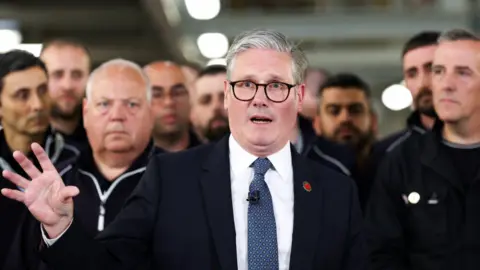
Read more on post.
Simon JackBusiness editor and
Chris MasonPolitical editor
The government is looking at ways to financially support the companies in Jaguar Land Rover’s (JLR) supply chain.
JLR halted car production after a cyber-attack at the end of August forced it to shut down its IT networks. Its factories remain suspended until next month at the earliest.
Fears are growing that some suppliers, in particular the smaller firms who solely rely on JLR’s business, could go bust without support.
One idea being explored is the government buying the component parts the suppliers build, to keep them in business until JLR’s production lines are up and running again.
Unions had called for a Covid-style furlough scheme, but ministers have ruled this out given its likely cost, sources have told the BBC.
Another option being considered is providing government-backed loans to suppliers, though this is understood to be out unpopular with suppliers.
The purchase and stockpiling of car parts by the government is also an option on the table, but this would present considerable logistical challenges.
JLR’s manufacturing process relies on the right part arriving at the right place, at the right time.
However, industry experts agree doing nothing risks firms in the supply chain, which employs tens of thousands of workers, facing bankruptcy.
The Business and Trade Select Committee is due to meet on Thursday afternoon to hear testimonies from businesses in JLR’s supply chain because of deep concern for some of these businesses to remain viable.
This evidence will be shared with the government afterwards.
Senior government figures are concerned about a pattern of cyber attacks on UK institutions and businesses, such as the British Library, Marks & Spencer, and the Co-op.
A group calling itself Scattered Lapsus$ Hunters has claimed responsibility for the hack on JLR, Marks & Spencer, and Co-op.
An investigation is under way into the cyber attack on JLR, which is believed to be costing the company at least £50m a week in lost production.
JLR would normally expect to build more than 1,000 cars a day at its three factories in Solihull and Wolverhampton in West Midlands and Halewood in Merseyside.
However, workers were sent home following the hack – which first came to light on 1 September – with no firm return date.
About 30,000 people are directly employed at those plants with a further 100,000 working in the firm’s supply chain.
On Tuesday, the business secretary and industry minister visited the West Midlands for the first time since the incident to meet JLR and the firms in its supply chain.
The Department for Business and Trade said ministers have discussed “the impacts of the cyber incident and how JLR can work towards restarting production”.
Additional reporting by Pritti Mistry

Business
BBC and news agencies launch film calling on Israel to allow foreign journalists into Gaza
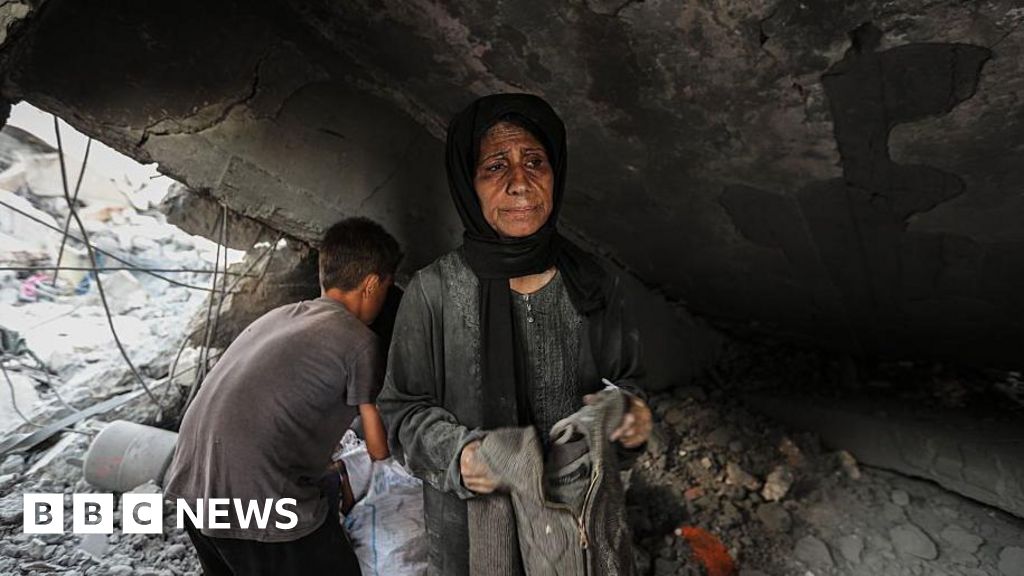
Read full article on post.
The BBC and three international news agencies have released a short film calling on Israel to allow foreign journalists into Gaza.
The film, launched by the corporation with Agence France-Presse (AFP), the Associated Press (AP) and Reuters, is narrated by veteran BBC journalist David Dimbleby.
He said: “International journalists must now be allowed into Gaza to share the burden with the Palestinian reporters there so we can all bring the facts to the world.”
Foreign journalists have been banned from entering Gaza independently since Israel launched its 2023 offensive following the Hamas 7 October attacks. A small number have been taken into the Strip by Israeli troops under controlled access.
The Israel Defense Forces (IDF) has previously said that to “allow journalists to report safely” in Gaza the military “accompanies them when in the battlefield”.
Last year Israel’s High Court of Justice ruled that restrictions on entry to Gaza were justified on security grounds.
Deborah Turness, CEO of BBC News, said: “It is almost two years since October 7th when the world witnessed Hamas’ atrocities. Since then, a war has been raging in Gaza but international journalists are not allowed in.
“We must now be let into Gaza. To work alongside local journalists, so we can all bring the facts to the world.”
The film premieres in New York on Wednesday night at an event hosted by the Committee to Protect Journalists, to coincide with the United Nations General Assembly. It features footage of historic events and atrocities captured by journalists.
They include scenes of the D-Day landings during World War Two, the Vietnam War, Ethiopia’s 1984 famine, China’s Tiananmen Square protests, the Rwandan genocide, the Syrian refugee crisis and the war in Ukraine.
“In Ukraine, journalists from around the world risk their lives every day to report the suffering of the people,” says Dimbleby in the film.
“But when it comes to Gaza the job of reporting falls solely to Palestinian journalists, who are paying a terrible cost, leaving fewer to bear witness.”
This is not the first time news organisations have called on Israeli authorities to allow journalists into the territory.
In July, BBC News, AFP, AP and Reuters issued a statement expressing “desperate concern” for journalists in Gaza experiencing dire circumstances including hunger and displacement.
In August, 27 countries including the UK backed a statement calling for Israel to allow immediate foreign media access to Gaza and condemned attacks on journalists there.
According to the UN Human Rights Office, at least 248 Palestinian journalists have been killed in Israeli attacks in Gaza.
Israel has repeatedly denied that its forces target journalists.
The Israeli military launched a campaign in Gaza in response to the Hamas-led attack on southern Israel on 7 October 2023, in which about 1,200 people were killed and 251 others were taken hostage.
At least 65,419 people have been killed in Gaza since then, according to the territory’s Hamas-run health ministry. The ministry’s figures are quoted by the UN and others as the most reliable source of statistics available on casualties.
-
Culture2 days ago
Taylor Swift’s new cinema outing generates more than €12million in just 24 hours
-
Politics2 days ago
European Parliament snubs Orbán with vote to shield Italian MEP from Hungarian arrest
-
Culture1 day ago
Milan Fashion Week 2025: Unmissable shows and Giorgio Armani in mind
-
Opinion2 days ago
AI Is Pointless If It Doesn’t Boost Productivity
-
Culture3 days ago
Marvel stars Mark Ruffalo and Pedro Pascal stand up for Jimmy Kimmel as Disney boycott intensifies
-
Business15 hours ago
Households to be offered energy bill changes, but unlikely to lead to savings
-
Environment1 week ago
Chimps drinking a lager a day in ripe fruit, study finds
-
Culture2 days ago
From Koniaków to Paris: how traditional Polish crocheting is captivating high fashion



